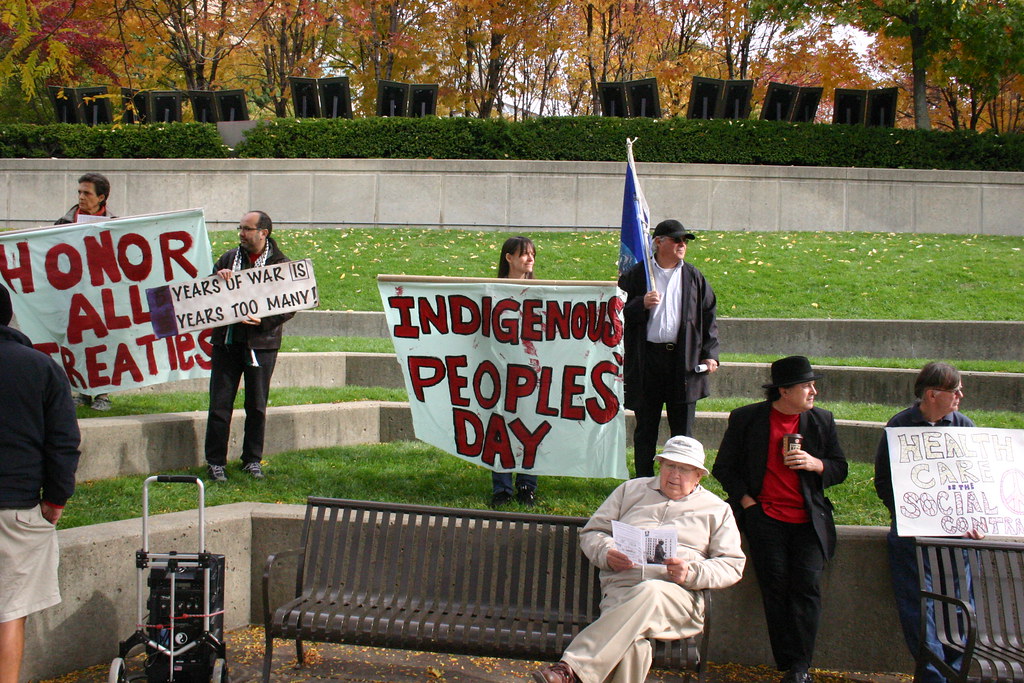Views expressed in opinion columns are the author’s own.
To acknowledge the genocide of Indigenous people in what is now the United States, many people commemorated Indigenous Peoples’Day instead of Columbus Day last Monday. While Indigenous resistance against colonization in the U.S. has existed since the arrival of settlers, conscious efforts on behalf of settlers and settler institutions — including universities — to learn about the Indigenous peoples whose lands they occupy have become widespread relatively recently.
Land acknowledgments are one of the ways institutions have attempted to publicly recognize the fact that the land they were built on was violently seized from Indigenous people. These land acknowledgements have become widespread in the university community — Northwestern and Miami University are among the schools that have done them — and many are easily searchable on university websites.
While it is arguable that land acknowledgments are an important start toward offering reparations to Indigenous communities, land acknowledgments are too often unaccompanied by significant efforts to work with local Indigenous communities. These statements, when lacking any accompanying reparations, serve as another kind of erasure that allows for settler-colonial violence to be named — but not actively accounted for — in consultation with the descendents of those harmed.
University land acknowledgements without reparations thus become a perfect example of the performative nature of so-called progressive institutions They use words such as “decolonization” and “reconciliation” when framing their relationship with Indigenous communities without actually de-colonizing or reconciling with the victims of harm. As Menominee scholar and activist Rowland “Ena͞emaehkiw” Keshena Robinson writes, “Reconciliation, decolonization, territorial acknowledgment, confession: none of them mean anything without the rematriation of our relational territorialities.”
For universities to go beyond superficial gestures, they need to accept that Indigenous people are still here and are still harmed by the same violence and dispossession their ancestors experienced. An important way to do this — and to begin the larger process of reparations — is by consulting with Indigenous people, especially those belonging to the communities that universities directly stole from. The University of Maryland, for example, was built on Piscataway Conoy land. Yet, it has done little to even acknowledge Indigenous people — while parts of the university have put out their own land acknowledgements, the institution as a whole hasn’t issued one — let alone pay them reparations, despite calls by Indigenous students at this university to do so.
Oglala Lakota activist Megan Red Shirt-Shaw has delineated two major courses of action that she says universities should take beyond land acknowledgements to truly support Indigenous students. One is returning the seized land to the Indigenous communities it was stolen from — rematriation — and the other is allowing Indigenous students to attend college on their tribal homelands for free.
Red Shirt-Shaw justifies these calls to action by reminding readers that land in itself is an integral part of education for Indigenous people and that in 1862, 11 million acres of land belonging to more than 250 tribes was forcibly expropriated to universities under the first Morrill Land Grant Act. In this sense, the genocide of Indigenous people and the seizure of their land is directly connected to the establishment of universities all over the country.
While these are just two of the actions Indigenous communities are demanding of universities, they illustrate that universities’ land acknowledgements without reparations are not enough. They can end up perpetuating the erasure of the descendants of those harmed by the Morrill Land Grant Acts and other oppressive policies. As a result, the growing trend of universities simply naming the harm they have caused to specific Indigenous communities won’t absolve universities of their dark pasts or their current responsibilities to Indigenous people.
Caterina Ieronimo is a junior government and politics major. She can be reached at ieronimocaterina@gmail.com.



